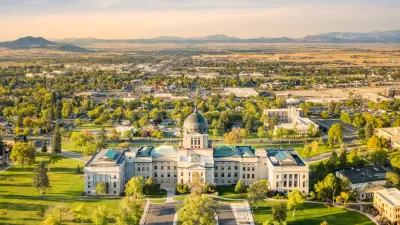Colorado could be the latest state, following Oregon and California, to legislate statewide preemption of local zoning codes to allow for more housing development.

The Polis administration in Colorado has released a “More Housing Now” proposal to preempt local zoning codes and allow more density in residential neighborhoods.
The expected bill will be sponsored by Sen. Dominick Moreno, D-Commerce City, Rep. Iman Jodeh, D-Aurora, and Rep. Steven Woodrow, D-Denver, with the support of environmental groups, affordable housing advocates, labor leaders, business interests, and some local government officials, according to an article by Andrew Kenney and Nathaniel Minor that broke the news.
Oregon was the first to use state preemption to overrule local control of zoning reform, in 2019. California joined the club in 2021. If Colorado approves the “More Housing Now” law, it would implement a tiered system of state-mandated residential zoning for the state’s communities.
“So-called ‘Tier 1’ cities would see the biggest impact from the Polis proposal. They include the state’s largest, such as Denver, Colorado Springs, Aurora, Fort Collins, Lakewood, Greeley, Boulder, Grand Junction, Pueblo and Arvada, plus smaller cities within large metro areas, like Castle Rock, Edgewater, Louisville, Windsor and Fountain,” according to Kenney and Minor. “Those communities would have to allow the construction of ‘middle housing,’ defined as townhomes and multiplexes with up to six units, as well as accessory dwelling units, on lots in all residential neighborhoods. (New single-family homes would still be allowed, too.)”
As for the cities not fitting into the Tier 1 bucket, “smaller ‘Tier 2’ cities and high country resort areas would have to create housing plans to detail how they plan to address housing shortfalls and keep current residents from being priced out, with goals identified by the state,” according to the article.
Additional coverage of the More Housing Now policy is available from a paywalled article published by Denver Post.
Read the article by Kenney and Minor, below, for more details about how the More Homes Now policy would remake growth management and long-term planning in the state of Colorado.
FULL STORY: Gov. Polis’ housing proposal would allow duplexes, townhomes, ADUs across many cities in Colorado

Americans May Be Stuck — But Why?
Americans are moving a lot less than they once did, and that is a problem. While Yoni Applebaum, in his highly-publicized article Stuck, gets the reasons badly wrong, it's still important to ask: why are we moving so much less than before?

Using Old Oil and Gas Wells for Green Energy Storage
Penn State researchers have found that repurposing abandoned oil and gas wells for geothermal-assisted compressed-air energy storage can boost efficiency, reduce environmental risks, and support clean energy and job transitions.

Placekeeping: Setting a New Precedent for City Planners
How a preservation-based approach to redevelopment and urban design can prevent displacement and honor legacy communities.

San Francisco’s Muni Ridership Grew in 2024
The system saw its highest ridership since before the Covid-19 pandemic, but faces a severe budget shortage in the coming year.

Colorado Lawmakers Move to Protect BRT Funding
In the face of potential federal funding cuts, CDOT leaders reasserted their commitment to planned bus rapid transit projects.

Safe Streets Funding in Jeopardy
The Trump administration is specifically targeting bike infrastructure and other road safety projects in its funding cuts.
Urban Design for Planners 1: Software Tools
This six-course series explores essential urban design concepts using open source software and equips planners with the tools they need to participate fully in the urban design process.
Planning for Universal Design
Learn the tools for implementing Universal Design in planning regulations.
Heyer Gruel & Associates PA
City of Moreno Valley
Institute for Housing and Urban Development Studies (IHS)
City of Grandview
Harvard GSD Executive Education
Salt Lake City
NYU Wagner Graduate School of Public Service
City of Cambridge, Maryland





























